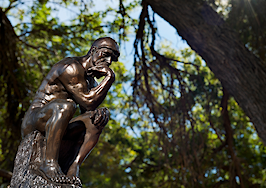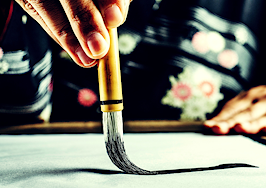This story was last updated Dec. 2, 2022.
Looking for a way to bring more revenue and abundance into your life? If so, it might be time to consider exploring the ancient Chinese practice of feng shui.
Why would one of the most successful broker-owners in the country put an anvil under his bed and a horse trough in back of his multimillion dollar home? His feng shui master recommended it. Did it work?
“It saved my business $400,000 in just one day.”
When I worked in Southern California, it was common for luxury agents and their clients to use the services of a feng shui expert to assist in staging a listing or to help them locate the best property to purchase. While some people might consider this to be superstitious, thousands of others swear by the results.
In the very prosperous city of Hong Kong, not only apartment layouts, but entire buildings and settlements are designed after consultations with feng shui masters. For example, the Hong Kong Shanghai Bank’s headquarters, designed by the British architect Norman Foster, has a big open space in front of it with no buildings blocking its view of the body of water in Victoria Harbor in Hong Kong. This is supposed to maintain the bank building’s positive, prosperous energy.
“Feng shui,” literally translated from the Chinese means “wind/water.” It’s pronounced “fung schway,” with “feng” meaning “wind,” and “shui,” meaning water. The practice originates from the Chinese philosophy of Taoism, and the idea is to optimize the placement and design of both entire buildings and/or home furnishings inside dwellings to create balance, harmony and a sense of prosperity. The elements that must be balanced are water, wood, fire, metal and earth.
If you’re interested in learning more about feng shui and how it applies to real estate, here are eight basic principles.
1. Avoid homes with bad energy
If possible, determine what is motivating the sellers to move. Are the owners moving for positive reasons? If so, this home could be an excellent choice.
On the other hand, if the sellers are moving to due to a business loss, divorce or horrible illness, this home is bad luck. Take your buyers elsewhere.
2. Avoid having money ‘drip away’
In feng shui, water represents abundance and money. Drippy faucets and leaky toilets represent money dripping away. Furthermore, feng shui experts recommend putting the lid down on the toilet and closing bathroom doors to separate the bathroom energy from other parts of the home.
In contrast, fountains or waterfalls that “flow” toward your property represent money flowing toward you. Placing a fountain near the front door is particularly auspicious in terms of attracting wealth, but it’s important that the water doesn’t become stagnant.
3. Let abundance flow through the front door
Feng shui masters believe that abundance flows in through the “mouth” or the front door. Consequently, making the “mouth” attractive will attract more abundance. To attract qualified buyers and more prosperity and fortune, here’s what to do:
- Place pots of colorful flowers by the front door and on the porch
- Nothing on the front porch should block the entrance to the front door nor should there be anything sharp, straight or angular aimed at the front door
- The doorbell should work (how can you attract abundance if you don’t know it’s ringing?)
- Make sure the doormat is in excellent condition. It’s especially important to choose one that says “Welcome!”
- You can also place symbols of affluence in a prominent place. This includes coins, bells or wind chimes in groups of six, seven or eight near the front door
4. Don’t let money run out the door
If a stairwell or the back door is visible from the front door, you can avoid having money run out the door by putting a beautiful area rug in the entry, a small table with fresh cut flowers in the center of the rug or placing live plants adjacent to the stairs. In each case, this breaks up the energy so that money won’t run away.
5. Use red and green to attract more money
Green is the color of money. Red is associated with abundance and good luck. One of the easiest ways to add green to any house is with live plants.
If you want to attract more money, place coins in a red sack. To determine where to put them, stand in the doorway to the room. The far left hand corner is where to place the sack of coins.
6. Avoid ‘poison arrows’
“Poison arrows” occur when there is too much energy directed to a single spot. For example, a house located on a T-intersection or at the end of a cul-de-sac, will have too much energy flowing toward it.
It’s better to avoid these properties if possible. If you or the seller owns this type of property, building a fence with lots of plants will help to disburse the energy.
Barren corners are also another type of “poison arrow.” To reduce the negative impact of a barren corner, place a plant, a screen or some other object to break up the energy.
7. Don’t forget your office
If possible, your desk should be positioned where your back is not to the door. Again, adding live plants, a fountain and coins in a red sack placed in the far left corner will increase the flow of abundance into your office.
8. Pay attention to intention
Feng shui works best when it’s tied to the intention of serving others rather than being focused on the money. Giving back to others is an important way to attract more abundance in your life.
If you’re feeling uncertain about using feng shui, why not start in your home, especially if you have a home office? Add some live plants, some red and green elements, and put a red bag that contains coins in the far left hand corner of your office. You might be very surprised to see more abundance flowing your way.
Special thanks to Shawne Mitchell of Village Properties Realtors of Santa Barbara whose three books on feng shui provided the basis of this article.
Bernice Ross, president and CEO of BrokerageUP and RealEstateCoach.com, is a national speaker, author and trainer with more than 1,000 published articles. Learn about her broker/manager training programs designed for women, by women, at BrokerageUp.com and her new agent sales training at RealEstateCoach.com/newagent.













